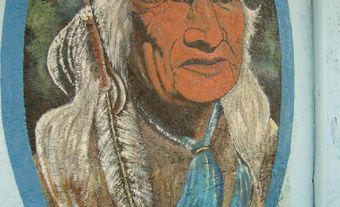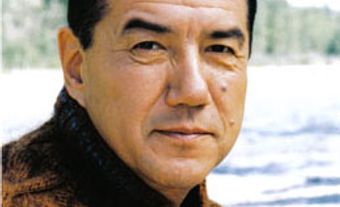Gordon Tootoosis, CM, actor, activist, band chief (born 25 October 1941 at Poundmaker Reserve near Cutknife, SK; died 5 July 2011 in Saskatoon, SK). Gordon Tootoosis was a prolific actor and a fierce advocate of Aboriginal rights, and often combined both efforts with the roles he played. He overcame a troubled childhood and alcoholism to become an exceptional role model for his fellow Plains Cree and others across North America. He was a Member of the Order of Canada and a co-founder of the Saskatchewan Native Theatre Company, which changed its name to the Gordon Tootoosis Nīkānīwin Theatre Company in 2015.
Early Years and Family Connections
A descendant of Yellow Mud Blanket, who was a brother of the legendary Plains Cree leader Pîhtokahanapiwiyin (Poundmaker), Gordon Tootoosis, was raised with his 13 siblings in the Plains Cree tradition until he was taken from his home and placed in one of the infamous residential schools, where he was treated harshly and forbidden to speak his own language. His father, John Tootoosis, was an activist for Aboriginal rights, which got the younger Tootoosis into trouble at school, including an expulsion when teachers caught him singing powwow with fellow students. John Tootoosis was the founding chief of the Federation of Saskatchewan Indian Nations (FSIN), and later became one of the founders of the Assembly of First Nations. Gordon later served as chief of his band and vice-president of the FSIN.
Early Career
After his traumatic school years, Gordon Tootoosis lived briefly in Whitehorse, where he worked as a mentor for youth. He then went into social work with the Saskatchewan Department of Welfare, specializing in work with children and young offenders. His interest in his own cultural traditions led him to become an accomplished powwow dancer and rodeo roper. He toured throughout Canada, Europe and South America with the Plains InterTribal Dance Troupe in the 1960s and 1970s, becoming one of North America's most popular powwow announcers.
Acting Career
After breaking into acting with a recurring role in the Edmonton-shot TV series Stoney Plain,
Tootoosis made his film debut as the Cree fugitive Almighty Voice in the Canadian feature Alien Thunder (1974, released on video as Dan Candy’s Law). The film starred Donald Sutherland and Chief Dan George, one of Tootoosis’s idols. Tootoosis then appeared in many theatre, television, film and radio productions, including the Genie Award-winning Black Robe (1991) and the Oscar-winning Legends of the Fall (1994), with Brad Pitt, Sir Anthony Hopkins and Tootoosis’s close friend, Métis actor Tantoo Cardinal. Tootoosis’s character, One Stab, also the film’s narrator, was changed from Cheyenne to Cree at Tootoosis’s insistence, an example of how he helped shape Hollywood’s sensitivity to Indigenous characters. Tootoosis regarded Legends of the Fall as the favourite film production of his career.
Tootoosis followed Legends of the Fall with another major Hollywood success, Disney’s Pocahontas (1995), in which he voiced the character of Kekata, a Powhatan shaman. The film was one of the year’s biggest hits. It won two Oscars and grossed nearly $150 million, although it generated some controversy for romanticising the Pocahontas myth. That same year, Tootoosis played Chief Powhatan in the live-action Canadian co-production, Pocahontas: The Legend.
Other film credits include: Leaving Normal (1992), with Meg Tilly; Lone Star (1996), with Kris Kristofferson and Matthew McConaughey; Alaska (1996), with Charlton Heston; and the thriller Reindeer Games (2000), with Ben Affleck and Charlize Theron. Tootoosis appeared in the Canadian films Song of Hiawatha (1997), alongside Graham Greene, Litefoot, Russell Means and Irene Bedard; Hank Williams First Nation (2005), which was adapted into a short-lived TV series of the same name in which he reprised his role as Adelard Fox; and the gritty, low-budget gem On the Corner (2003), which earned Tootoosis the Best Supporting Actor Award at the American Indian Movie Awards.
Throughout his career, Tootoosis carefully selected roles that did not perpetuate negative stereotypes of Indigenous communities. In 1992, he spotlighted Aboriginal culture on Canadian television by appearing in “Peacemaker,” one of the first Heritage Minutes. Tootoosis played an elder who teaches his granddaughter about the Haudenosuanee (Iroquois) legend of the Tree of Great Peace and the origins of the HaudenosauneeConfederacy.
Tootoosis became well known in Canada for his recurring role as the villainous Albert Golo in the popular CBC TV series North of 60 (1992–97), for which he received two Gemini Award nominations. Audiences found Tootoosis so convincing that the actor reported encounters with fans who accosted him for bad behaviour. However, Tootoosis cited North of 60 as a milestone for representations of Aboriginal peoples, praising the show in an interview with the Saskatoon Star-Phoenix for “portraying the daily struggles and realities of the native people, how lives were touched, especially in dealing with the laws and politics.”
Tootoosis’s other television credits include Danger Bay (1988), MacGyver (1988, 1991), Northern Exposure (1993), Lonesome Dove: The Series (1994), The X-Files (1996), Due South (1998), Smallville (2002, 2004) and the CBC TV movie Shania: A Life in Eight Albums (2005), about singer Shania Twain. He dramatized stories of Aboriginal history as the lead in the CBC miniseries Big Bear (1998), again with his friend Tantoo Cardinal; the TV movie One Dead Indian (2006), about the tragic Ipperwash standoff in Ontario; and the TV movie Bury My Heart at Wounded Knee (2007), which won six Emmy Awards, including Best Made for Television Movie.
Tootoosis also appeared in recurring roles in the TV series The Campbells (1986); Auf Wiedersehen, Pet (2002); Moccasin Flats (2003–06); Wapos Bay (2005–10), which earned him a Gemini Award; and the APTN series Blackstone (2011), which was his final appearance before his death.
Theatre Work
Tootoosis performed in theatre early in his career, appearing in productions in Saskatoon, Calgary and Toronto. His time with Toronto’s Theatre Passe Muraille was especially influential for its emphasis on inclusivity and experimentation. Among Tootoosis’s most notable credits from this period was his performance as Chief Crowfoot in Rudy Wiebe’s Far as the Eye Can See (1977) at the Tarragon Theatre.
In 1999, Tootoosis and Tantoo Cardinal founded the Saskatchewan Native Theatre Company (SNTC) along with several of their peers to offer a creative outlet for at-risk youth. The SNTC was renamed the Gordon Tootoosis Nīkānīwin Theatre Company in 2015 to honour the actor’s legacy. Among Tootoosis’s final performances was the lead in Saskatchewan playwright Kenneth T. Williams's Gordon Winter at the Persephone Theatre in Saskatoon in 2010 before touring with the play to the Prairie Scene Festival in Ottawa.
Personal Life
Tootoosis and his wife, Irene Seseequaisis, met in residential school and married in 1965. Despite Tootoosis’s success, they continued to live on the Poundmaker Cree First Nation in Saskatchewan, where they raised a family of three daughters and two adopted sons. After losing a daughter to cancer in 1997, they raised her four children. Tootoosis died of pneumonia at age 69.
Awards
Award of Excellence, ACTRA Awards (2003)
Best Supporting Actor (On the Corner), American Indian Movie Awards (2004)
Member, Order of Canada (2004)
Walk of Honour, Dreamspeakers Film Festival (2005)
Best Individual or Ensemble Performance in an Animated Program or Series (Wapos Bay), Gemini Awards (2008)
Henry Woolf Continuing Achievement Award, Saskatoon and Area Theatre Awards (2011)
Inductee, Playback Canadian Film & TV Hall of Fame, Playback (2015)

 Share on Facebook
Share on Facebook Share on X
Share on X Share by Email
Share by Email Share on Google Classroom
Share on Google Classroom



